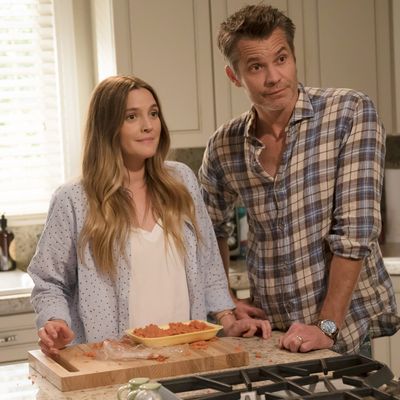
Santa Clarita Diet is a one-joke comedy. The joke gets told and retold from different angles over the course of a half-hour (give or take a few minutes, because this is a Netflix series), and each time the punch line is a bit nastier. I’m sure it’ll be a huge success because the joke is a reasonably good one, but I wouldn’t blame anyone who stopped watching after an episode or two because they felt like they got it the first time, and having the punch line yelled into your ear a bit louder each time doesn’t necessarily refresh it.
What is this joke, you ask? Maybe you don’t want to know yet. In fact, if you’ve successfully avoided media coverage of the show up till now and would rather find it out for yourself, you should probably skip the rest of this review and come back to it later — but only if you want a less-than-enthused take on a series that seems very well-liked so far.
Created by Victor Fresco, the man behind Better Off Ted and Andy Richter Controls the Universe, the series stars Drew Barrymore and Timothy Olyphant (who co-executive produced) as Sheila and Joel Hammond, married Southern California real-estate agents who live in a depressingly indistinct suburb with their teenage daughter, Abby (Liv Hewson). Their lives take a very dark turn one day when Sheila projectile barfs while showing a house. And keeps barfing. And barfs some more. And some more. (The puke scene is the show’s comedy methodology boiled down to a single moment.)
To make things weirder, Sheila has no pulse and her blood has become dark, with a tar-like consistency. Once we learn that Sheila has a mysterious curse-like condition that renders her, um, dead, and craving human flesh, Santa Clarita Diet becomes an exceptionally gruesome and sardonic comedy about marriage and parenting with overtones of an addiction narrative. Joel settles into the role of Sheila’s enabler, trying to figure out some way to feed his wife’s craving without becoming a party to murder. Of course this is a doomed enterprise: Once Sheila kills and eats a co-worker, she realizes nothing satisfies like fresh meat. (This twist is reminiscent of Park Chan-wook’s great film Thirst, about a couple of vampire lovers, one of whom only eats the dead for moral reasons. See it if you haven’t already.)
There’s plenty of potential here for something besides endless reiterations of the same situation. Sheila needs to feast on human flesh, and after an initial round of moral or logistical objections, Joel breaks down and helps slake her thirst. Like many a zombie film (George Romero’s Dawn of the Dead in particular), Sheila’s condition and Joel’s enabling of it have overtones of rampant consumerism and conscienceless capitalism: One person in a partnership wants her horrendous, apparently bottomless appetite satisfied, and her partner goes along even though he knows he’s violating basics of decency. There’s also a bit of a slippery-slope parable to the whole thing: Joel, who does most of the changing in this show, starts out strenuously objecting to the necessity of keeping Sheila supplied with warm meat, then starts rationalizing why he has to do it anyway (out of love, of course — to the actors’ credit, you do believe that their bond is strong enough to support a murder spree).
The thing is, though, none of this stuff is teased out so that it becomes anything other than a notion, one that hovers somewhere above or below all the gut-noshing and blood-guzzling without emerging into full view. If Santa Clarita Diet were more brazen and outrageous and less obviously afraid of alienating its core audience — people watching on a laptop or phone, hopefully in relative privacy and not at, say, a restaurant or preschool or doctor’s office — it might have been a lot more satisfying.
But the show seems to lack the courage of its minimal convictions. A lot of the creative choices are either half-baked (the sets are backlot-bland, practically bold-facing “The Tedious Sameness of Suburban Life”) or overly cute (weirdly so, given all the TV-MA bloodletting). This is another sitcom that’s what I call “Network Dark” as opposed to truly, unapologetically dark. I can’t imagine anyone actually finding it outrageous or even particularly subversive, and this is pretty clearly what Fresco & Co. were after, otherwise they wouldn’t have scored the entire show with ostentatiously “quirky” music, heavy on plucked violins and dingy little bells, that rhetorically asks the viewer “You’re having fun, right?”
Barrymore and Olyphant try their damnedest not to wink at the viewer. The dialogue keeps defeating them, though there are a few winners here and there, as when Sheila and Joel struggle to settle on a murder victim so vile that nobody will miss them, and Joel asks, “Where are all the young, single Hitlers?” Olyphant seems to enjoy playing something other than a skull-busting badass, but the nebbish husband and secret pot-smoker part doesn’t come naturally to him, despite his Matthew Broderick–like intonations. Barrymore is similarly affable and okay, though I kept imagining the miracles that could’ve been wrought by a more resourceful actress, like Rachel Bloom, or Felicity Huffman in Desperate Housewives mode.
I nitpick, of course, because that’s what I do. Santa Clarita Diet isn’t awful — every episode has a few good laughs, and you’ll probably just let Netflix keep cycling through to the next episode rather than switching over to something else, which is the yardstick of creative success for streaming services these days. But I kept wanting more from it besides constant refreshment of the same scenario, and it never seemed inclined to offer it.


